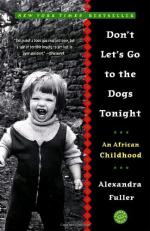|
This section contains 857 words (approx. 3 pages at 400 words per page) |

|
Perspective
The memoir is told in first person, present tense from Alexandra Bobo Fuller's point of view. The main character is a child at the beginning of the story, and the perceptions are immersed in that character. For example, Bobo's mother habitually carries an Uzi, a machine gun manufactured in Israel. Bobo refers to it phonetically as an oozie, because that is how she understood the word as a child. This matter-of-fact attitude extends to terrorists, land mines, and the revolution going on all around them. Bobo accepts lessons in delivering a baby or treating wounds if all the grownups are dead, with childlike practicality.
Racism, financial inequality and the politics of revolution are addressed in the novel indirectly. Fuller never labels her parents as racist, because as a child she did not perceive them that way. She merely reports their actions and statements accurately. When Mum shows a...
|
This section contains 857 words (approx. 3 pages at 400 words per page) |

|




